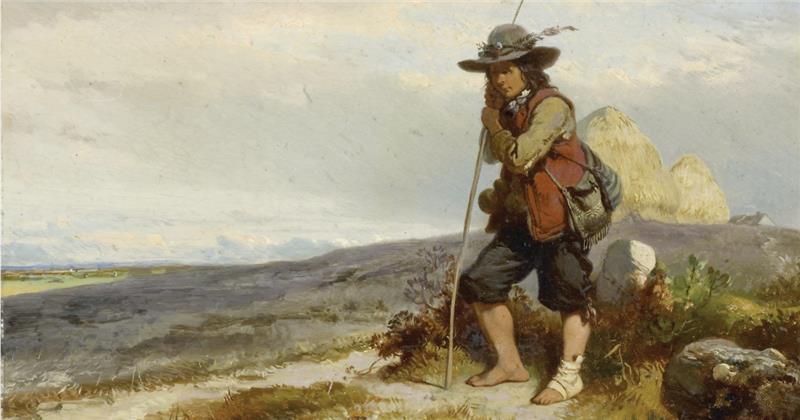The Route to True Security
“Am I a dog that you come at me with sticks?"
David closes verse four of Psalm 23 with a reference to two iconic tools of the trade for shepherds: the rod and the staff. These became a source of comfort to David, even in the midst of very difficult circumstances. While these might seem like odd objects to imbue with this quality, David chose the rod and the staff of the shepherd to convey the Lord’s comfort. These tools would have been especially familiar to David as a shepherd. They would have also been easily recognizable by David’s contemporaries. Taking a closer look at each tool will help us appreciate how they strengthen the metaphor of God as the Sovereign Shepherd that David employs in Psalm 23.
The Rod
The Hebrew word that David uses for rod, Sē-Bēt, has multiple possible translations. The word can be used in reference to a timeline for a family or a people. One could simply translate the word as a “stick.” A rod or stick was not an uncommon part of the shepherd’s arsenal in the ancient Near-East. Remember the insults that Goliath hurled at the Israelite army as he sized up the young shepherd David. “Am I a dog that you come at me with sticks?” (1 Samuel 17). The shepherd’s rod or stick is described as a root stem with a bulb at one end that could be used as a club or a tomahawk-like weapon. It could be launched with deadly accuracy. David might have launched a rod at a lion or bear intent on attacking one of his sheep. Perhaps David pictured a rod whistling through the air and crashing into the head of his foes as he wrote the words of Psalm 3:7 ESV, “Arise, O Lord! Save me, O my God! For you strike all my enemies on the cheek; you break the teeth of the wicked.” David drew comfort in knowing that like a shepherd, the Lord watched over him and kept his enemies at bay.
In addition to warding off attackers, the rod was also traditionally used as a tool of discipline for sheep. A quick toss of the rod could reroute a sheep from bolting for an opening in the sheep pen. It could also be used to quickly break up a sheep scuffle.
Another translation of this word is “scepter.” It would be a bit unusual to see a shepherd in the Judean wilderness using a scepter to ward off threats. However, we must keep in mind that Psalm 23 employs metaphorical language. The Lord is both Shepherd and King. David’s sense of the Lord’s comfort was bolstered by the image of the stick-wielding shepherd and the scepter-wielding King. The rod or stick served as a means of protection as dispensed by the shepherd and discipline dispensed by the King. David was keenly aware that the Lord’s people needed both. As one writer has said, “The Messianic era is possible because of a fundamental principle understood in antiquity: Protection and discipline breed security. The psalmist reflects this dynamic with poetic simplicity when he says, ‘Your rod and staff, they comfort me.’”
The Staff
The staff is perhaps the most recognizable and iconic tool employed by the shepherd. It is used to gently move sheep to where they should be. It can be used to knock down high branches to provide a meal for a hungry heard. It is handy for rescuing lambs who have found themselves in hard to reach and difficult spots. One of my favorite uses for the staff is for a weary shepherd to find some much-needed rest. A number of paintings, including “A Roman Shepherd” by the 19th century Swedish artist Gustaf Wilhelm Palm capture a weary shepherd in need of rest. The paintings depict the look of a man who is in desperate need of rest yet knows there is still much work to be done. He welcomes this brief respite, knowing that at any moment he will need to return to the tasks of the day. The shepherd places his full weight and trust on the staff.
For Israel, the Lord is the strong staff which they rely upon for rest and comfort. Isaiah admonished Israel when they placed their trust in neighbors rather than in the Lord. “Look, I know you are depending on Egypt, that splintered reed of a staff, which pierces the hand of anyone who leans on it! Such is Pharaoh king of Egypt to all who depend on him.” (Isaiah 36:6 NIV). It stands as a sharp contrast to the reliability of the strength and comfort that David finds in the Lord.
Many today have been toppled by placing their weight on splintered reeds. A few examples of false rods and staffs come to mind. Perhaps we trust in our job, our bank account or our IRA. Some trust in relationships and love. Some trust in their own talent and skills. Others lean heavily on addictions and substances. David notes in Psalm 20 that some trust in horses and chariots. When any of these give way, as they often do, we find ourselves on the ground, bruised, disoriented and full of painful splinters. We can, however, have full confidence and comfort in the Lord. His strong and unbreakable rod and staff comfort us. We can lean into the Lord with our full weight, assured that He will not be moved.







